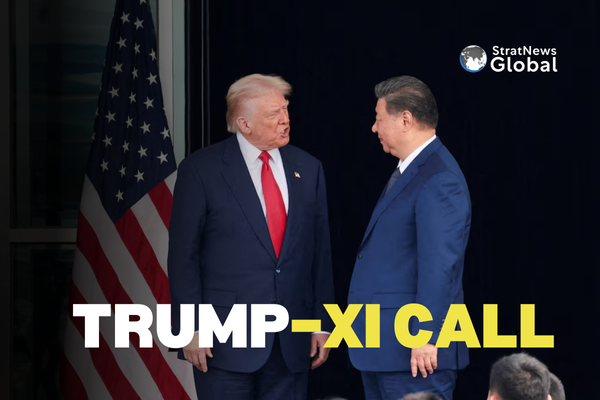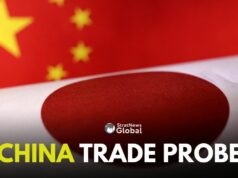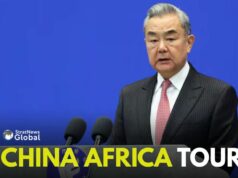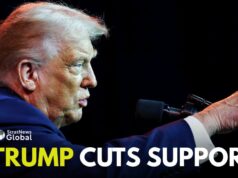President Donald Trump described relations with China as “extremely strong” on Monday after a phone call with Chinese President Xi Jinping, who told Trump that Taiwan’s “return to China” is a key part of Beijing’s vision for the world order.
The call, which had not been previously announced by either side, came weeks after the two leaders met in South Korea, where they agreed to a framework for a trade deal still awaiting finalisation.
China is currently facing one of its biggest diplomatic crises in years with US ally Japan. Earlier this month, Japanese Prime Minister Sanae Takaichi warned that any Chinese attack on democratically governed Taiwan could trigger a Japanese military response.
According to China’s official Xinhua news agency, Xi said China and the United States once fought together against fascism and militarism and should now “work together to safeguard the outcomes of World War Two.” He added that “Taiwan’s return to China is an integral part of the post-war international order.”
Beijing considers Taiwan part of its territory and has not ruled out using force to take control of the island. Taiwan’s government rejects that claim and insists that only its people can decide their own future.
Trump Notes Progress on Trade, Avoids Mention of Taiwan
Trump did not refer to Taiwan in his Truth Social post about his “very good” call with Xi. He said the conversation covered several topics, including Ukraine, fentanyl, and US farm products.
“Our relationship with China is extremely strong! This call was a follow-up to our highly successful meeting in South Korea three weeks ago. Since then, there has been significant progress on both sides in keeping our agreements current and accurate,” Trump said.
He added that he had accepted Xi’s invitation to visit Beijing in April and had, in turn, invited Xi for a state visit to the US later this year.
White House Press Secretary Karoline Leavitt said the call lasted about an hour and focused mainly on trade. “We are pleased with what we’ve seen from the Chinese, and they feel the same way,” Leavitt told reporters.
Trade Framework and Economic Cooperation
Following months of trade tensions caused by tariffs, Trump and Xi reached a framework agreement during their October 30 meeting in South Korea. Under the deal, Washington agreed not to impose 100% tariffs on Chinese imports, while China paused plans for an export licensing system covering rare earth minerals and magnets.
US Treasury Secretary Scott Bessent said he hoped the final agreement on rare earths would be completed by Thanksgiving. In the meantime, China has resumed purchases of US soybeans and suspended expanded restrictions on rare earth exports. The US reduced tariffs on Chinese goods by 10% in exchange for Beijing’s pledge to help curb the flow of chemicals used in making the synthetic opioid fentanyl.
Xi said China-US relations had “stabilised and improved” since the South Korea meeting. “The facts again show that cooperation benefits both sides while confrontation hurts both,” he told Trump, urging both nations to sustain positive momentum. Xi also reaffirmed China’s support for all efforts conducive to peace in Ukraine.
Japan’s Missile Plans Draw Beijing’s Criticism
China’s readout of the call placed strong emphasis on Taiwan, a topic not mentioned in either side’s statement after the South Korea meeting. Trump had said at the time that they did not discuss Taiwan, an issue Beijing repeatedly raises as a red line in relations with Washington.Weeks later, the US approved a $330 million arms sale to Taipei.
Taiwan expert Bonnie Glaser, of the German Marshall Fund of the United States, said Xi’s latest statement echoed remarks he made during a visit to Russia in May. “Xi likely used the opportunity to set out his stance on Taiwan, perhaps because there was a lot of media on the Busan meeting which noted that Taiwan was not discussed,” she said.
Tensions between China and Japan have also intensified. Earlier on Monday, Beijing criticised Tokyo’s plan to deploy a medium-range surface-to-air missile unit on Yonaguni, an island about 110 kilometres from Taiwan, calling it an attempt to “create regional tension and provoke military confrontation.”
Marvin Park, a former director for Taiwan on the US National Security Council, said the Japanese missiles were clearly defensive, with a range of only about 50 kilometres, meaning they could not reach Taiwan. “China’s deeper fear is about the potential of future Japanese militarisation. If they bring in this purely defensive system now, that could make it easier for Japan to advocate for more advanced capabilities in the southwest islands,” said Park, now with the American Global Strategies consultancy.
Trump has not directly intervened in the ongoing diplomatic row between Japan and China, though his ambassador to Japan, George Glass, has stated that the US supports Tokyo in the face of what he called China’s “coercion.”
(with inputs from Reuters)





